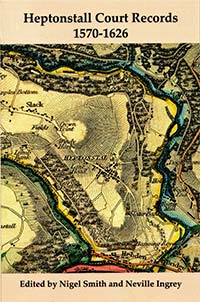Friday, 20 June 2025
 Heptonstall Court Records 1570-1626
Heptonstall Court Records 1570-1626
Hebden Bridge Local History Society is celebrating the culmination of their most ambitious project yet: the publication of a handsome and hefty volume of the manor court records for Heptonstall from 1570 to 1626.
The volume will be of immense interest to family and local historians, as well as those interested in the ways society was organized at a local level.
The project began with a group of members of the Society working to increase their knowledge of both Latin and local history by translating local historical documents. The tutor was Neville Ingrey, previously a Latin master at Hipperholme Grammar School. When the Covid pandemic put a stop to meetings, the group decided to use email contact to undertake the translation of the Latin entries in the Heptonstall manor court rolls. Neville ensured the accuracy and consistency of the translations.
A detailed introduction by co-editor Dr. Nigel Smith makes clear the context and explains the complications of the rules-based system of local management.
The manorial court was an early system of regulating the community, and these entries record the proceedings of the baron court, which dealt with transfers of property, upholding the rights of the lord of the manor, and ensuring that offences against the community were punished. Juries were selected from the lord's tenants, both freeholders and copyholders, though in practice the roles were held by the most affluent tenants.
Transfers of land were made symbolically as well as in law, with the property 'surrendered and given up with a straw'. Three of the documents have the actual straw threaded horizontally through three short vertical cuts in the paper.
Local by-laws or 'pains' were tailored to the needs of the community, and after the jury had submitted their report, the court could issue a fine. Some of the infringements were against the lord, such as encroachment (taking in land from the moors without consent) or poaching game (which all belonged to the lord). The stability of the community was valued, so offences against the neighbourhood were taken seriously. Subdividing houses risked increasing the number of poor and beggars who would be a drain on the township; hedges and water courses had to be maintained and livestock kept under control.
There is extensive information about local families and the properties they owned, with searches made possible through the comprehensive indexes of people and places. This volume provides new opportunities for family and local historians. The detailed subject index allows anyone with an interest in how society was organized to see how disputes were settled and norms of behaviour set to manage the day to day necessity of getting along with the neighbours.
A glossary helps with unfamiliar terminology you might encounter, and images of the original rolls give some sense of the scale of the achievement.
This is a limited edition and is available now from the Hebden Bridge Local History Society.
Heptonstall Court Records 1570-1626
Edited by Nigel Smith and Neville Ingrey
476 pages, 7 illustrations, 4 maps. £20.
Published by Hebden Bridge Local History Society
Available online here.

